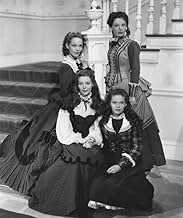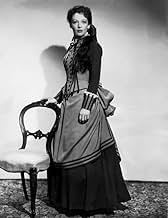ÉVALUATION IMDb
7,0/10
1,2 k
MA NOTE
L'histoire de comment Alexander Graham Bell a inventé le téléphone.L'histoire de comment Alexander Graham Bell a inventé le téléphone.L'histoire de comment Alexander Graham Bell a inventé le téléphone.
Histoire
Le saviez-vous
- AnecdotesAfter the film was released, the telephone was commonly called the "Ameche," a slang term referring to actor Don Ameche who played the telephone's inventor. This association is explained in the film Ball of Fire (1941), showing the term was still in use two years after the release of the original film.
- GaffesOne of the stories in the movie, that is set in 1873, is that Alexander Graham Bell invented the telephone "in his youth". But the first telephone was invented by Antonio Meucci in 1860 and Johann Philipp Reis in 1861, who also called his device "telephone", not Bell as it's stated in the movie. Bell didn't invent THE telephone but A telephone, the Bell-telephone.
- Citations
Mrs. Hubbard: Mr. Watson, please eat something. You must have the appetite of a bird.
Thomas Watson: Yes, Ma'am, a vulture.
- ConnexionsFeatured in AFI Life Achievement Award: A Tribute to Henry Fonda (1978)
- Bandes originalesThe First Noel
Traditional 17th century hymn
Sung a cappella by unidentified carollers on Christmas Eve
Commentaire en vedette
Movies about history are very important. They also need to be entertaining and believable. All three of those qualities need to be involved in a film such as this. Don Ameche brings to the silver screen an early representation of the life of Alexander Graham Bell and his contribution to the world. The invention of the telegraph and the telephone are explored in this Irving Cummings film.
I bet you didn't know that AGB got his inspiration for the telephone from his years of teaching the deaf talk and communicate. That brings us to the love interest portion of the film, when we are introduced to the future Mrs. Mable Bell, who also is deaf, played by Loretta Young. It is a very interesting contrast between the film's intention and what the facts entail, because the first full decade of the talkies and sound happened in the 1930s, which makes that the quietest decade in film history, as it applies to full sound in film. It is interesting that there is no music in the movie, hardly at all, because this is a movie about trying to achieve the ability to hear and to transmit sound, so this is, kind of, an interesting juxtaposition of how this movie feels.
It also is interesting seeing a film that was made only 65 years after Bell did his experiments, so you get a more uniquely believable script, then if it was one produced today, because 150 years have now gone by since Bell did his experiments. It also is apparent that the mind of an inventor can also be driven by his love of people or his compassion towards the world he/she lives in. None of that is more apparent when we see the love that is shared between Bell and his deaf students and his eventual love to Mable.
Ameche is also contrasted with his less intelligent assistant Thomas Watson, played by Henry Fonda, who compensates for his lack of certain knowledge by being Bell's friend and cheerleader. This film teaches us that drive and desire doesn't always have to lead to power and money, but can sometimes lead to what it really should, love and accomplishment.
8.1 (B MyGrade) = 8 IMDB.
I bet you didn't know that AGB got his inspiration for the telephone from his years of teaching the deaf talk and communicate. That brings us to the love interest portion of the film, when we are introduced to the future Mrs. Mable Bell, who also is deaf, played by Loretta Young. It is a very interesting contrast between the film's intention and what the facts entail, because the first full decade of the talkies and sound happened in the 1930s, which makes that the quietest decade in film history, as it applies to full sound in film. It is interesting that there is no music in the movie, hardly at all, because this is a movie about trying to achieve the ability to hear and to transmit sound, so this is, kind of, an interesting juxtaposition of how this movie feels.
It also is interesting seeing a film that was made only 65 years after Bell did his experiments, so you get a more uniquely believable script, then if it was one produced today, because 150 years have now gone by since Bell did his experiments. It also is apparent that the mind of an inventor can also be driven by his love of people or his compassion towards the world he/she lives in. None of that is more apparent when we see the love that is shared between Bell and his deaf students and his eventual love to Mable.
Ameche is also contrasted with his less intelligent assistant Thomas Watson, played by Henry Fonda, who compensates for his lack of certain knowledge by being Bell's friend and cheerleader. This film teaches us that drive and desire doesn't always have to lead to power and money, but can sometimes lead to what it really should, love and accomplishment.
8.1 (B MyGrade) = 8 IMDB.
- PCC0921
- 1 févr. 2022
- Lien permanent
Meilleurs choix
Connectez-vous pour évaluer et surveiller les recommandations personnalisées
- How long is The Story of Alexander Graham Bell?Propulsé par Alexa
Détails
- Date de sortie
- Pays d’origine
- Langue
- Aussi connu sous le nom de
- Alexander Graham Bell
- Lieux de tournage
- sociétés de production
- Consultez plus de crédits d'entreprise sur IMDbPro
Box-office
- Budget
- 1 500 000 $ US (estimation)
- Durée1 heure 38 minutes
- Couleur
- Rapport de forme
- 1.37 : 1
Contribuer à cette page
Suggérer une modification ou ajouter du contenu manquant

Lacune principale
By what name was The Story of Alexander Graham Bell (1939) officially released in Canada in English?
Répondre






































